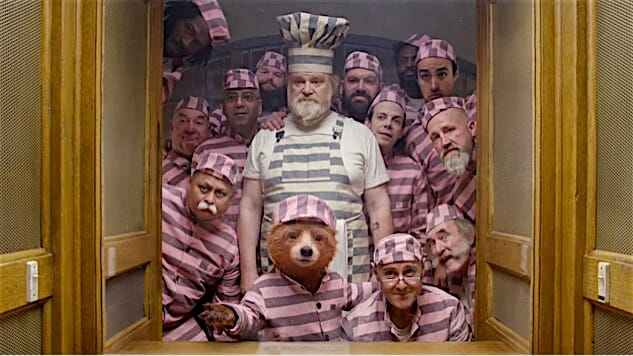Brexit Pursued By a Bear: The Immigrant Narrative of Paddington 2

Not to downplay any particular incidents or news, but lately: Everything feels like a waking nightmare, with every bit of newsworthy misfortune amplified at the same volume. The world has made me, at least, very raw of late, so the most inoffensive—at worst anodyne—examples of tenderness have been catalyst enough to reduce me to tears. Be it Lady Bird’s (Saoirse Ronan) compassion with Danny’s (Lucas Hedges) coming out in Lady Bird, or a diorama-decorated memory directed by Todd Haynes, one shouldn’t overestimate a certain kind of earnest niceness in film, a recognition of the cruelty of the world that does nothing to dampen the film’s restorative powers. What of Paddington Bear, whose films give him the spotlight as an Other amongst middle class Brits? Yes, friends, Paddington 2 had me in tears too
What the Paddington films share with those above is a sense of wonder for the ordinary, most likely the product of director Paul King and co-screenwriter Simon Farnaby’s acute ability to instill a palpable desire of belonging into a CGI teddy bear voiced by Ben Whishaw. We have, for better or worse (and I would argue the former), reached a point in computer generated technology in which Paddington’s eyes can dilate realistically. His eyes, then, say everything, open to any modicum of familial comfort. It is extremely ordinary to want to be a part of something, to crave the intimacy of loved ones.
But why does something so simple feel so outsized and enormously warm? Paddington 2 comes out on the other side of Brexit and the 2016 U.S. Presidential election, two political events that made decisive statements about how people in both regions conceptualize immigrant bodies: that they are unworthy of being protected, both a physical and ideological threat, their danger mythologized beyond statistics. The first Paddington, released in 2014, was emotionally prophetic in its illustration of the hokey moral panic wrought by xenophobes. Four years later, cultural output, from Wonder to Zootopia, bends over backwards for cute messages of acceptance to combat an overwhelming sense of displacement for the Other in society. Maybe because the constant expression on Paddington’s furry face reads, “I’m just happy to be here,” Paddington and Paddington 2 appear much like the bear himself: humble, with a very real desire to be a part of a larger community.
In an interview with producer and Harry Potter alumnus David Heyman, he remarks on the casting of Ben Whishaw as the voice of Paddington, referring to Whishaw as “youthful” and, notably, “slightly other,” suggesting the filmmaker’s intention to illustrate the character in the margins but attempting to situate himself within a larger, normative society. And Whishaw’s voice does provide that sweetness, that “other” quality, his elocution and speech patterns like that of someone who has practiced belonging, almost imaginarily perfect, endearingly affected. (His “right” and “polite” have a linguistic quality that does not quite belong in the modern middle class London in which he finds himself.)
-

-

-

-

-

-

-

-

-

-

-

-

-

-

-

-

-

-

-

-

-

-

-

-

-

-

-

-

-

-

-

-

-

-

-

-

-

-

-

-








































